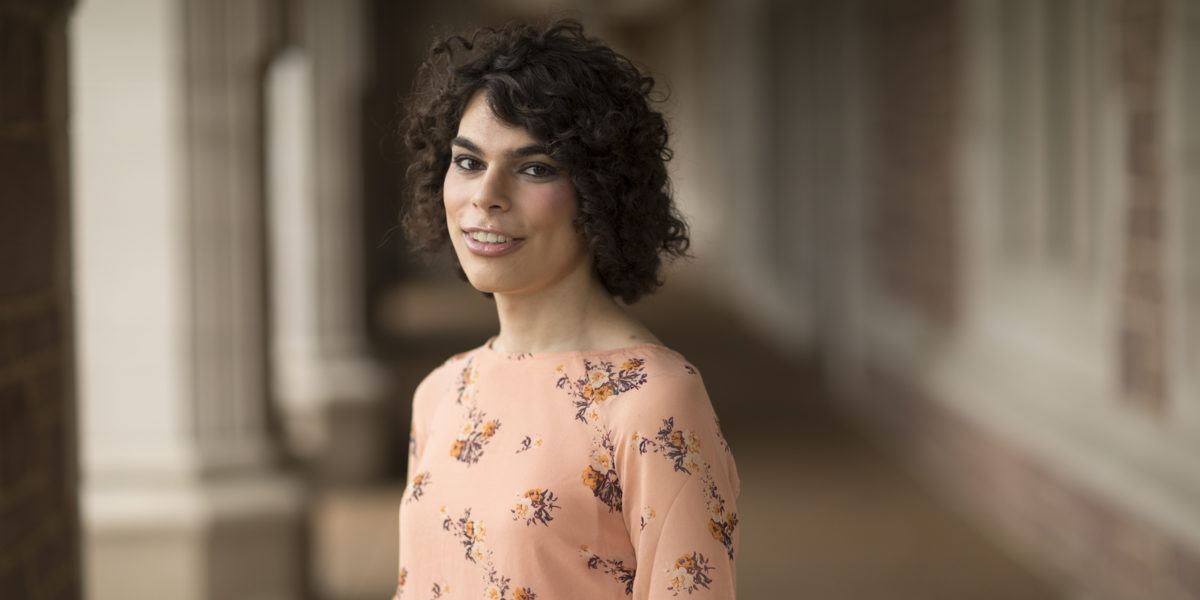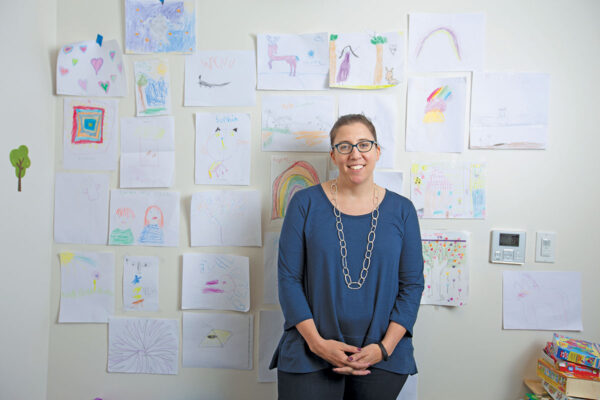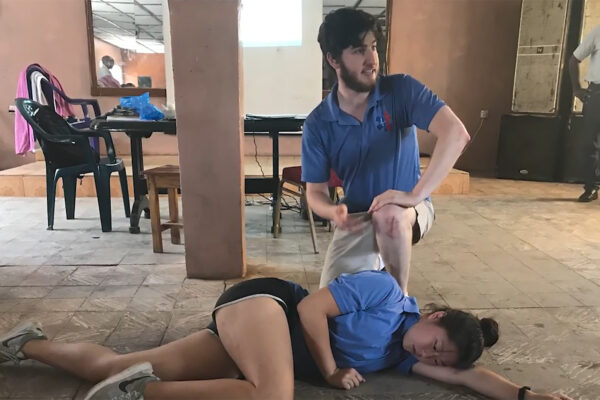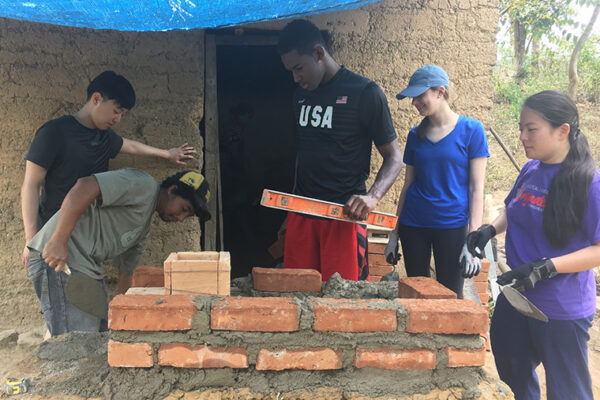As a high school student in Boston, Jessica Gray quit the drama club to join the lacrosse team. But she never stopped acting. Gray, 22, was born in the body of a boy, wanted desperately to be a man and worked hard to perfect the look and manners of the stereotypical bro.
 “Everything I did, from how I coughed, to my posture, to the jokes I made, was about appearing masculine,” Gray said. “I knew how I felt inside, so I made sure every action I made and word I said went towards hiding those feelings.”
“Everything I did, from how I coughed, to my posture, to the jokes I made, was about appearing masculine,” Gray said. “I knew how I felt inside, so I made sure every action I made and word I said went towards hiding those feelings.”
Gray graduates May 18 with a degree in computer science from the School of Engineering & Applied Science at Washington University in St. Louis. She is one of the school’s four valedictorians. It’s an impressive achievement but not the one that matters most to her.
“Finally, I am myself,” Gray said. “For the first time in my life, I’m not hiding anything from myself or from the world. I am truly happy.”
As a toddler, Gray would dream she was a girl and pray that God would give her the body to match who she was inside. Later, she would try to find answers online but wasn’t sure where to start.
“I would use search terms like, ‘Boy who wants to be a girl,’” Gray said. “Eventually, I found the word ‘transgender,’ and I was like, ‘Oh, so that’s what I’ve been feeling this whole time.’”
She also encountered a lot of myths online — that her feelings were just a phase or that being transgender was a mental illness. She certainly did not see any stories about trans people living fulfilling lives. So she guarded her secret throughout middle and high school, never revealing to her parents, or her friends or really, herself, who she truly was.
College, the place where so many students find they can express their true identities, was just another stage for Gray. She joined a fraternity and tried desperately to be one of the guys. But, inside, she felt like she was dying.
Eventually, she could no longer ignore who she was. The winter break of her junior year before her semester abroad in New Zealand, she came out to her older sister and then her oldest brother. And then, when her sister visited New Zealand with their mother, Gray told her parents.
“We got my dad on Skype and I told them,” Gray said. “I don’t know what I was expecting. For a long time, I thought I was protecting them. I didn’t think they would stop loving me but I thought they would be disappointed that I wasn’t their perfect son.”
Gray will never forget what happened next.
“My mom said to me, ‘Bring her on,’” Gray said. “It meant everything. My parents didn’t know anything at that time about what it means to be trans, but they gave me their immediate acceptance and support.”
Gray knew it was time to take action. Back at Washington University for her senior year, she moved out of the apartment she shared with her fraternity brothers so she could begin her transition in private.
“My life over the next couple of months was a dull and bitter routine,” Gray recalled. “Every morning, I would put on this mask to go to campus. I couldn’t wait until the end of the day, when I could strip it off in the isolation of my apartment.”
‘A long, hard day’
Everything changed on Nov. 27, 2017, when she came out on Facebook:
“Alright, here goes nothing,” the post began. “I am a transgender woman.”
For her first day at school as her true self, Gray put on makeup and high-heeled boots.
“I very much wanted it to be, ‘Yeah, that just happened,’” Gray said. “Online, people had been very supportive. But in class and around campus, people were staring at me and talking about me. It was a long, hard day.”
Around the time Gray came out, the #MeToo movement had arrived, revealing just how prevalent sexual assault and harassment are in schools and workplaces. Gray was not surprised. She knew how men would denigrate women behind closed doors and diminish their voices. She was once one of them.
“Previously, my reaction would be, ‘That’s the way it is,’ and I would do what I needed to fit in to protect myself,” Gray said. “I’ve said things I didn’t believe and that I knew were wrong. I’ve said things I would never consider saying now. I hate the person I pretended to be.”
Gray remembers the first time she was on the other end of “mansplaining.” She was working with a group of male students on a class assignment. Gray, a gifted coder who has interned at both Google and Workaday, Inc., figured out the answer right away.
“They just kept talking,” Gray said. “Finally they got to the right answer — my answer. In the past, working on problems, I could just say the answer. I could just write the code. But this time, I was ignored. Maybe it was because I’m trans or maybe it’s because I’m a woman, but it was not because I’m not a good coder.”
There have been other disconcerting reminders that her identity poses risks. She doesn’t feel safe walking alone at night and she knows that women, especially transgender women, experience higher rates of sexual assault. She is hopeful that the ongoing “TitleMine” movement at Washington University will improve campus culture by raising awareness, protecting survivors and exposing the ways that toxic concepts of gender hurt both women and men.
“There was a point in the very beginning when nobody was saying anything about it,” Gray said. “Over time, people talk to each other and discuss their own and each other’s experiences. Soon enough, survivors are sharing brave and powerful op-eds. And then suddenly you’ve got hundreds if not thousands of people rallying and organizing together for a unified cause, fixing a problem in their community.”
Person to person
But it all starts with a single conversation. “And then it takes some more along the way,” she said.
Gray is having her own conversations via an interesting vehicle, so to speak: Uber. She knows that many Uber drivers, like much of the population as a whole, don’t know or don’t like trans people.
“I get in the car determined to make my Uber drivers love me,” Gray said. “I ask them questions about their lives. I find out what makes them different. And if it seems right, I explain my experiences and relate them to theirs as best and as politely as I can. I don’t always out myself, but if anyone misgenders me, I will correct them.”
One driver told her she was sick and that she would never be a woman. Another recommended that she carry a gun to protect herself. And then there was the driver who told her that she was sent to him by God.
“He really opened up to me,” Gray said. “He accidentally would say things like, ‘Have a great day, man,’ and I would gently correct him. But it was a real conversation between two people who really enjoyed learning about each other. He left with more information and a more positive image of trans people.”
Gray’s great Uber experiment is working, and she has proof. Her Uber rating has gone up from a 4.6 from before her transition to 4.87.
“Talking human-being-to-human-being has a much more powerful effect than being confronted by a computer screen and a stream of distant stories,” said Gray, who hopes to become an advocate for transgender people as well as for larger forms of social and cultural change. “It would be easy just to dismiss someone when they say terrible things. But the world can’t move forward if you just leave those people behind.
“That’s why I am learning to work with the world where it is, so it can one day be a better place for all of us.”



